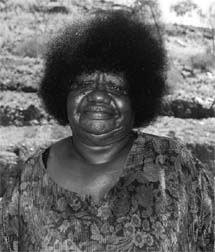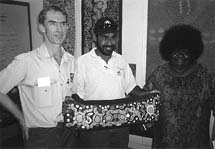Doreen George
Gerry McCarthy waxes lyrical about
one of Borroloola's best
Doreen George was born before the Second
World War at Robinson River and has early memories of war planes flying
across the vast Gulf Savannah.
Her fond memories as a child relate to the frequent bush trips with
her mother and sisters, learning the ancient ways of the Garawa people,
leaving the station life behind to discover the secrets of the country
and the dreaming.
"My Dad was in the stockcamp for as long as I can remember. Lots
of managers and drovers knew my Dad. He was that top cattle man with
the big mob of family that would work for stations", says Doreen
before breaking into her hearty laugh and wide smile.
"Ya know that bushfire Bunji, well when the old girls would see
that smoke rising they would get real happy because their Garawa men
would be coming back to station with big mobs of cattle', Doreen recalls.
We all 'crack up' into a real good laugh. Kelly George, Doreen's husband
is with us sharing the memories and helping with the dates and events.
"Macintyre was an early manager for Calvert Hills in my Dad time.
Had a wife named May Chong, those fellas were from Burketown",
says Doreen.
Kelly jumps in, "Yeah but that Macintyre came from Winton, long
way".
Doreen gives Kelly the nod and a loving smile as she sits in reflection.
These two old station people spent the next three hours describing the
early days of their station lives, the wonderful characters that influenced
them and some proper cheeky white fellas who were far from fair or friendly!
Doreen commanded the stage on this fine day with names, places and events.
Grand stories in reflection among frightening recounts of pain and suffering.
Out of this intricate oral history came the deep love of her father
and the wonderful adventures he shared with her, her sisters and brothers
and anyone else that he worked with.
"Dad and Old Redbank Rory, his brother, took on everything in that
country. I travelled on foot with my father from job to job. We walked
from Calvert Hills to Seigal Creek once when I was a teenager and it
was there that I learnt to ride, muster cattle and wheel scrubber bulls!
"I got thrown plenty, Bunji, mainly in the morning! Dad would look
after me, pick me up and give me the instructions. I really didn't like
that boot at first, but Dad taught me and my sister Hilda about wearing
boots and the proper place for your boot in the irons", says Doreen
in full instructional mode.
Kelly jumps in with a demonstration. Using a paper punch and his slender
hand, he explains to me the importance of having a proper foot and leg
when in the saddle and the dangers of riding if not wearing a correct
stockman's outfit.
Doreen agrees but adds she could not get used to wearing those old army
coats the manager would give her. "Might belong to a dead fella,
Bunji", she quips with a rare serious look.
The trio break out again into fits of laughter once again. Doreen continues
to entertain us with exciting stories of adventure and hardship, of
being introduced to new people, new customs, new foods and new experiences
that were generations removed from her comfortable Garawa traditions
and law.
Doreen described her first encounter with a pig. She was with her father's
team delivering a mob of cattle to the Queensland drover on Old Corinda
Station. One of the drover's team shot the pig, butchered it and cooked
it in the ground oven. Kelly causes me to fall off my chair laughing
when he sternly retorts, "Poor bugger, what this new animal comin''
along, first time you meet him, then you straight away eat him"!!!
Doreen returns some sanity to the interview with a salient, "Me
and my sister were frightened to eat it! I bin whisper to Hilda, we
could die here 'Bubba' from that new beef, long way from Mum. Dad whispered
that it was OK to eat and he helped us girls".
Doreen's true and real compassion for all people surfaced regularly
in her stories and reflections. The hardships of life, the frequent
separations from her family, the cultural misunderstandings and the
severe punishments from those in stolen positions of authority all combine
under the 'cut' of the stockwhip to inspire the listener while demonstrating
Doreen's rare, brilliant nature and genius.
One of her most compassionate stories was of how a manager shot her
father in a punitive action that nearly cost the young Rory Brown his
life. The Garawa discussed this position over many nights but little
could be done to 'white fellas' that carried pistols on their belts.
Nature, and I suspect ancient Garawa magic, did take its course when
the manager in question met with a serious riding accident and broke
his leg.
The honour and courage of a young Doreen stayed behind 'tailing' the
wild cattle until help arrived from the station homestead.
My own shallow reaction was why the care and concern? The reply came
in the form of a stern and wise warning.
"He carried a gun all the time, Bunji, even slept with that gun".
"Probably thought he was bloody John Wayne"!
When not working in the big house, fencing or digging the vast station
gardens, Doreen was riding colts, mustering or travelling with droving
teams. Doreen regularly reflected on the intrigue that took her interest
as a young girl. Why the old women would paint the babies with charcoal
to make them look more black? Why her sisters had to hide in the truck
under the swags when the manager would meet with a Police or Welfare
patrol? Why good station men would be punished with a whip or locked
in the station gaol house for crimes of which they had no understanding?
"We had some good managers in those days, kind - and we had some
proper cheeky ones", warns Doreen with a rare stern expression.
Doreen shared a very private story in the course of the interview. It
happened on Calvert Hills Station while she was tailing a mob of fresh
cattle near the river. As she was riding she witnessed a fierce fight
between a brown snake and a goanna.
The fight went on for some time with the goanna emerging as the eventual
winner. Covered in blood and suffering severe poisoning the goanna commenced
a search by digging many holes looking for what Doreen describes as
his medicine plant. After a number of attempts the goanna recovered
some small 'yam like roots' from the ground and began to eat them. With
his eyes rolling back and his life in the balance he then rested under
a 'conkerberry bush'.
Doreen watched carefully while the goanna regained his strength and
eventually walked off into his rocky country. To this day Doreen searches
for those yams and believes they are active anti-venom for snakebite.
She and her family followed a 'white' station family to Floraville in
the early 1960s. Kelly and Doreen assisted the drover, old Mick Hogan,
escort the families cattle to help stock the Floraville Station. The
couple lived there for three years before Doreen moved into Burketown
and had another child. Kelly was constantly at work on nearby stations
leaving Doreen to cope with the hardships of an outback town life.
Doreen reflects that on the days before she had civil rights and the
problems she faced in raising her children. Not shy for work, Doreen
took employment in the Albert Hotel and then to the Salt Pan store to
supplement the families income. Their last station job was on Miranda
Downs where both Kelly and Doreen returned to the work they knew best.
Doreen gathered her family together and travelled to Borroloola on the
death of her beloved father in 1989.
Today Doreen George is an elected member of the Town Council, the Rrumburriya
Malandari Council and the Borroloola School Council. Doreen works at
the school and in the town with the Yanula/Garawa Language Group and
runs a household of children going right through to great-grand children.
This fine Australian stands tall as an outstanding citizen in our community.
She is a living treasure and a true human resource for all people.
"Ya know what, on my day I bin working all my life and I'm still
workin'! I tell my kids this everyday and they say, that's all in the
past but, Bunji, that need to be said for everyone, everyday ...!"


Doreen won first prize
in the contemporary section of the 1998 Normandy Community Indigenous
Art Award for her and carved canoe. Terry Smith and Lan Liddy from Normandy
presented the prizes.